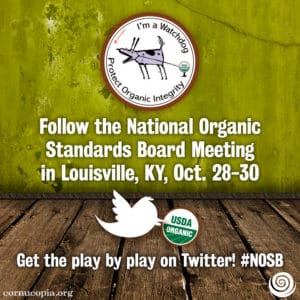 Last Updated: 10-30-14, 3:38 p.m. ET
Last Updated: 10-30-14, 3:38 p.m. ET
Join The Cornucopia Institute as we live tweet from the National Organic Standards Board meeting in Louisville, Kentucky. We will be sharing the play by play with our Twitter followers under #NOSB or simply follow our stream.
If you’re not already following us on Twitter, please do so here.
Read The Cornucopia Institute’s written comments to the NOSB here.
You can also stay updated throughout the meeting right here:
Thursday, October 30, 2014
3:38 p.m. ET: Following lunch, the NOSB returns to its business and elects its officers for next year. Jean Richardson (consumer rep) is elected chair, Tracy Favre (conservation rep) is elected vice-chair, and Harold Austin (handler, Zirkle Fruit) is elected secretary.
The NOSB turns its attention to work items for 2015. More than 100 synthetic and non-organic materials are coming up for sunset review – a daunting task to ensure a full and proper assessment of each substances essentiality and the human health/environment impacts.
Miles McEvoy estimates that $3 million would be required for technical reviews of each substance. To see a discussion of how lacking this has been at times in the past, see https://www.cornucopia.org/USDA/OrganicWatergateWhitePaper.pdf.
Before adjourning the semiannual meeting, the board honors its four members whose terms expire at the end of this year.
11:29 a.m. ET: The board votes 12-3 against the removal of tragacanth gum from the National List.
Then they move to take another brief break.
11:25 a.m. ET: NOSB brings back the tabled motion to consider relisting of tragacanth gum.
Joe Dixon (retailer, Whole Foods) indicates that the fact that a certifier has one client using this material is sufficient to him to indicate tragacanth gum is essential.
Jay Feldman (enviro, Beyond Pesticides) asks if the the new letter from the user of the material that was given to the board yesterday was untimely.
Cornucopia contacted the original petitioner for the allowed use of this material three times. They never responded, nor did they submit any information in support of keeping this material on the National List.
11:13 a.m. ET: The full board votes 9 to 6 against removing aqueous potassium silicate from the list.
Prior to the sunset changes imposed by the USDA in Sept. 2013, this material would have no longer been allowed for use in organics. This cuts to the core of the argument that the new process means the sun will never set on nearly every non-organic and synthetic material on or added to the National List.
11:06 a.m. ET: NOSB considers relisting of aqueous potassium silicate. When is was initially approved for use, the Crops Subcommittee determined that it was not essential and it was not compatible with organic agriculture – yet it was still approved by the full board.
11:00 a.m. ET: After a brief break, the NOSB turns to sodium carbonate peroxyhydrate.
No discussion. Board votes 10-5 to reject removal from the National List.
See Cornucopia’s comments on why we opposed the relisting of sodium carbonate peroxyhydrate: https://www.cornucopia.org/nosb/
10:31 a.m. ET: Jay Feldman (enviro rep and Beyond Pesticides): No motion is required by the full board level for this material; no criteria provided for review as required. I will vote against this.
Zea Sonnebend (scientist rep and CCOF employee): Couldn’t disagree more with Jay
NOSB board votes 11-3, with one abstention, against removal of sulfurous acid from the National List.
10:22 a.m. ET: Nick Maravell (farmer): We have process colliding with substance.
Harold Austin (handler rep): This is about soil health; this does it for farmers in the drier arid areas.
Francis Thicke (envir rep and farmer): We can argue whether or not we should farm in the desert; this product will help in those areas.
10:12 a.m. ET: Question of how sunset works again rises as board considers voting on sulfurous acid.
Colehour Bondera (farmer rep): Are we looking at the material or at the process? We cannot isolate them.
10:03 a.m. ET: Crops Subcommittee begins discussion of sulfurous acid and its relisting on the National List.
9:53 a.m. ET: Inert ingredients, added to chemicals used in organic pest control, should be thoroughly reviewed and approved. Inerts can have their own damaging impacts. This has been a long simmering item before the NOSB. An udpate of its status was provided by program staff concerning the working group working on this.
Jay Feldman (enviro rep from Beyond Pesticides): I appeal to the program to bump this up to a higher priority and move this along. He wryly observes, “Hurry up and do this before I die.”
Feldman has extensive knowledge on this topic from his years of work on this issue with BP. It’s most unfortunate that more progress was not made during his 5 year term on the board, which ends this meeting.
9:32 a.m. ET: Jennifer Taylor (consumer rep) asks the NOSB to tell the NOP to stop work on the drafting of aquaculture rules.
Miles McEvoy: That would not be a good process It would be appropriate for the program to finish the draft rules, then open for public and board feedback.
Tracy Favre (enviro/cons rep): Many of us have concerns, but let the process move forward.
No further action taken by board. McEvoy indicated on Tuesday that drafting of the rules was underway.
Given the pace of this process, Cornucopia believes it will take many more months for these to be released (if not longer).
9:23 a.m. ET: The NOSB unanimously votes to send this matter to the USDA’s National Organic Program for resolution.
9:19 a.m. ET: NOP Director McEvoy: This will take resources; board could help us prioritize this type of work. GMO vaccines not authorized by regulation and will take us some time for analysis.
Jean Richardson: We can’t get the information we need to develop an approved list of vaccines. Companies won’t provide confidential information. This has to go back to the government/NOP to get that type of information.
Nick Maravell: To keep this issue within the NOSB would be the definition of insanity. We would need a lot of resources to pursue.
8:58 a.m. ET: Jean Richardson (consumer rep): This isn’t an easy issue; we should remind poultry producers that they can petition for an exception (such as for salmonella).
Nick Maravell (farmer): It is possible to make vaccines without GMOs. It has been done for 100+ years. If we aren’t firm on this, there will be no incentive (for development).
8:42 a.m. ET: The Livestock Subcommittee is up and discussing the thorny issue of GMO vaccines used in livestock production.
For more on Cornucopia’s position on GMO vaccines, go to https://www.cornucopia.org/nosb/ and read the fall meeting comments.
Wednesday, October 29, 2014
4:59 p.m. ET: Handling Subcommittee is nearly done, than the Compliance, Accreditation and Certification Subcommittee will be up, focusing on an assessment of soil conservation practices.
4:27 p.m. ET: NOSB moves on to discussion of non-organic and synthetic materials that are scheduled for sunset in 2016. No votes on these materials will occur at this meeting, only a preliminary discussion. See Cornucopia’s comments for a full roster of these materials at https://www.cornucopia.org/nosb/.
4:14 p.m. ET: Nick Maravell: If the industry is moving away from carrageenan to gellan gum, this shows cooperation.
Joe Dixon: There was no checklist used as part of the review.
NOSB votes to keep gellan gum on the National List by 12-3 vote.
4:06 p.m. ET: Joe Dixon (retailer, Whole Foods): New information from one user leads us to believe tragacanth gum is needed.
Zea: This material is probably worth keeping and giving it the benefit of the doubt.
Harold: Lack of any public comments for continued use of this material lent us to think that we should remove. Then we got this new information from one user of the material yesterday that changed our mind.
Joe Dixon: Handling Subcommittee did not use the checklist (that other committees use) on health, environmental impact and essentiality.
Board tables vote until tomorrow.
3:57 p.m. ET: Procedural motion on point of order fails, 9-6. Voting fault line closely resembles Cornucopia analysis of NOSB member votes over the past 5 years.
3:52 p.m. ET: The Cornucopia Institute summarizes the debate:
Jay: “Protect the process”
Zea: “Get the job done, leave the politics behind”
Jay: “The process protects the outcome”
3:51 p.m. ET: Subcommittees absolutely followed the procedures, says McEvoy.
3:49 p.m. ET: Zea (scientist): You are saying the only way the full board can be on the record is by the subcommitee making a motion to remove (Q to Miles McEvoy).
Not a problem for this meeting, McEvoy says, because all materials have that motion at this meeting.
3:46 p.m. ET: Tracy Favre: These are interim solutions … we are on a moving train. Failure to move on these materials leaves further uncertainty in the industry. This is an opportunity for us to move forward while recognizing that there are things we can do to make the process better.
3:44 p.m. ET: Responding to a question from Nick Maravell (farmer), Miles says the plan is to work with the Policy and Procedures Subcommittee to further clarify this process. The memo that was sent to the board a few weeks ago only pertains to this meeting on how things work.
3:42 p.m. ET: Miles McEvoy: Subcommittees have a role to play; it is only the full board that makes those final recommendations. He says that procedures were clarified in a memo to the board a few weeks ago. NOSB is responsible for reviewing all materials under sunset process.
3:35 p.m. ET: Jay Feldman (envir. rep and Beyond Pesticides): The process is almost as important as the outcome. It hurt me to find out that members were meeting privately to develop the new procedures, and not as the full board.
We constantly hear how we must honor prior boards and procedures. That is not being done.
3:30 p.m. ET: Zea Sonnebend (scientist rep and CCOF employee): I do not trust motives of my colleagues on the board … they might want to remove all materials from the list. Leave the politics to the politicians and allow us to do our job — NOP should tell us how to do this. Zea gets applause.
3:25 p.m. ET: Mac Stone (certifier rep) says he thinks it should be harder to get materials on the national list and harder to take them off (which is the newly instituted process).
John Foster (handler rep from EarthBound) wants to vote on every material.
Tracy Favre (envir. rep), tends to agree with John and Mac. Risk that people may misunderstand subcommittee votes is a risk on every material.
Harold Stone, (handler rep from Zirkle): Let’s give this new process a try and see what we can make of it.
Colehour (farmer): We all need to be following the same process …. (and) we don’t.
3:15 p.m. ET: We need to start this (process) out right and do it well: Colehour Bondera (farmer). If the NOP wants to issue a new federal register notice with some corrections, then they should get right on it …. We aren’t able to speak (now) in a coherent manner on this process.
3:11 p.m. ET: Francis Thicke (farmer) adds that in his subcommittee (Crops) similar problems arose when members voted to remove a substance without really intending to vote that way when the full board weighs in. Misleading or confusing the public has consequences.
3:07 p.m. ET: Nick Maravell (farmer) argues that the maker and seconder of the motion should truly believe in their motion, otherwise confusing to the public when they vote against their own motion.
3:02 p.m. ET: Handling Subcommittee turns to tragacanth gum. Jay Feldman (Beyond Pesticides) raises a point of order challenging the way the motion was brought to the board. Board discussing how this fits into the new sunset process.
2:59 p.m. ET: Handling Subcommittee votes to withdraw algal flour recommendation and reconsider. The petitioner finally provided some more information on the manufacturing of this substance in their written and oral testimony.
2:56 p.m. ET: NOSB Handling cCommittee moves to center stage. Handling Subcommittee withdraws current glycerin recommendation so they can reword it.
Very difficult material, lot of moving parts, want to make sure when they come back with a proposal it would be a good proposal.
2:33 p.m. ET: Marty Mesh for Florida Organic Growers, long time certifier, has the last word from the public in the morning.
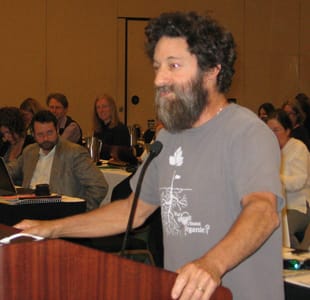 |
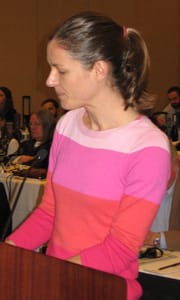 |
2:29 p.m. ET: Charlotte Vallaeys of Consumers Union says of Sunset changes: broken promises hurt consumer confidence. She also tells the NOSB that Consumers Union is opposed to substituting algal oil for eggs and milk (real organic food).
12:04 p.m. ET: Growers and a product manufacturer testify about the use of sulfurous acid. Gerald Davis, from Grimway Farms, advocates for continued use of sulfurous acid as a soil amendment for acidic soils and reducing irrigation needs, fertilizer use, and improving crop quality. The machine costs at least $30,000 though, so not available for all scales of agriculture.
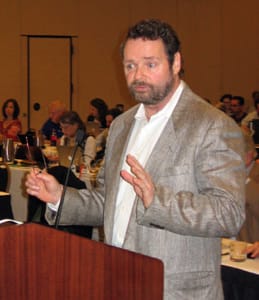 |
11:42 a.m. ET: Cornucuopia Codirector Will Fantle congratulates the NOSB for reclaiming some of their authority with the chairing of the meeting and reestablishment of the policy and procedures subcommittee. He calls for the development of new technical reviews for the 100+ synthetic and non-organic materials coming up for review in 2017, as many of the initial reviews were poorly done. And he decries the languishing of enforcement action against the giant Shamrock factory dairy in AZ, that was found guilty of organic violations by the USDA in 2011 (based on a Cornucopia complaint in 2008), but is still operating under appeal.
10:39 a.m. ET: John Brunquell of Egg Innovations says methionine use in poultry operations is an animal welfare issue. He says they need continuing access to vaccines (such as a salmonella vaccine). He lobbies for letting birds outside.
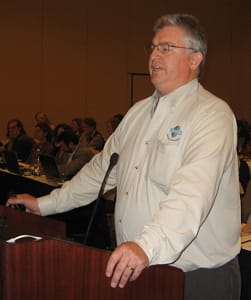 |
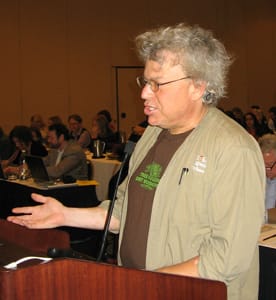 |
10:35 a.m. ET: Mitch Blumenthal is a self-defined tree hugging, dirt loving farmer and owner of Global Organics Specialty Source (an organic produce supplier). Expresses concerns about the intersection of GMOs and crops/seeds. We “can’t let” this label be diluted. He is also a Cornucopia policy advisor.
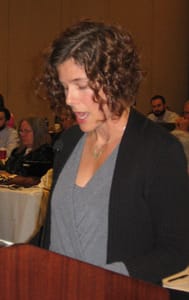 |
Cornucopia |
10:23 a.m. ET: Cornucopia staff member Rebecca Thistlethwaite speaks to the NOSB about animal vaccines. The NOP needs to produce a list of which animal vaccines may be made using genetic engineering techniques. The NOSB has asked for this, but the NOP has not delivered.
Thistlethwaite also addresses the use of sulfurous acid, saying it can help reclaim high pH soils and water. Yet there are serious safety issues in operating sulfur burners and they can emit sulfur dioxide emissions. We need more information in order to relist this material.
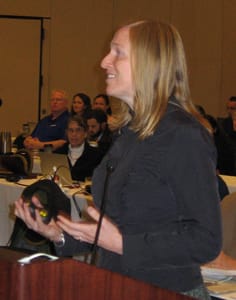 |
9:15 a.m. ET: Alexis Baden-Mayer, of the Organic Consumers Association, tells the NOSB to reclaim their power to restore the sunset process. Notes that the OCA is in communication with 2 million consumers and this is a very hot item for these people, and nearly 100,000 have signed a petition protesting the sunset changes.
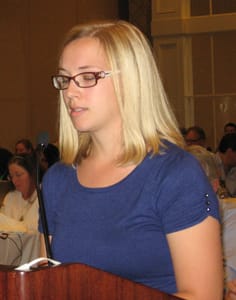 |
10:10 a.m. ET: Kelly Shea speaks in favor or renewal of gellan gum, says markets for organic farmers will be reduced without. Shea does not tell the board and public that she is an executive of WhiteWave.
9:48 a.m. ET: Allison Leathers, who grew up on a sheep farm in MN and is studying to be an extension agent, notes that healthy soils are the foundation of organic agriculture. She asks for improvements to organic system plans that would have inspectors visit farms during different seasons to get a fuller picture of land management practices. Allison is a citizen lobbyist for Cornucopia.
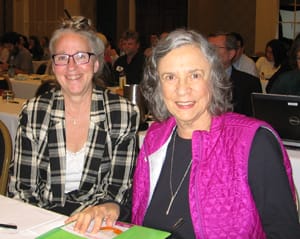 |
9:41 a.m. ET: Proud citizen lobbyists and volunteers for Cornucopia Joan Levin and Robin Migalla present testimony to the NOSB. Joan, an organic enthusiast who followed J.I. Rodale, called for the removal of boiler chemicals up for sunset — all three fail federal OFPA criteria She added that food processing agents SAPP and TSPP are not essential and shouldn’t be renewed.
Robin Migalla discussed gellan gum, a highly processed synthetic material with isopropyl alcohol residues. When the original petitioner asked for this substance to be listed, they described it as a non-organic synthetic substance. Yet the word synthetic has been removed from the listing. Cornucopia opposes its relisting.
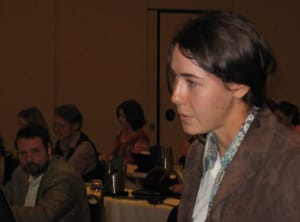 |
9:24 a.m. ET: 5th generation farmer from Kansas, Dimitria Stephens, supports the thorough review of all materials. “We want the NOSB to feel empowered to do what they need to do.” She also noted her role as an official of the certifier OCIA.
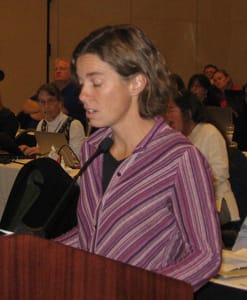 |
9:13 a.m. ET: Aimee Simpson, staff attorney for Beyond Pesticides, provides a detailed breakdown of federal law as it relates to the “Sunset” of non-organic materials and synthetics. She outlines how the new process arbitrarily established by the USDA violates the law. She urges the NOSB to request that the USDA “revoke” the September 2013 memo that set the new procedures.
9:08 a.m. ET: Cornucopia’s Dr. Linley Dixon discusses the damage being done by persistent pesticides that remain in compost and take years to break down. She has seen the problem on her own farm. There is a need to ban these persistent pesticides across the country.
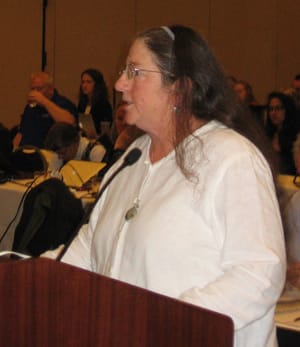 |
8:53 a.m. ET: Harriet Behar, of MOSES, demands fair compensation for organic farmers affected by pesticide drift.
8:41 a.m. ET: Mac Stone, NOSB member from the certifier community, offers some opening remarks from his Kentucky perspective. He says because of the turmoil at the last meeting, he “uninvited” the KY state secretary of agriculture. He also uninvited Wendell Berry. Didn’t want them to get the wrong impression about organics.
Tuesday, October 28, 2014
5:18 p.m. ET: Alexis Randolph, from certifier QAI, tells the NOSB that they have one client who uses tragacanth gum.
Phil LaRocca, organic winemaker from California, concludes the public testimony. He calls for the removal of marsala and sherry as non-organic ingredients, noting that there are organic versions available that can meet the need. He also tells Miles McEvoy that organic farmers are concerned about the impact of and threat posed by GMOs. He has been collecting comments from organic farmers for the past several months and will be sharing them with the NOP.
There will be more public testimony on Wednesday.
The NOSB will spend the remainder of its meeting time today hearing from its subcommittees, with a close look at research priorities for organic food and agriculture.
 |
3:59 p.m. ET: Pat Kerrigan of the Organic Consumers Association calls on the NOSB and the USDA to require companies to submit manufacturing information for vaccines used in organic livestock agriculture. Companies producing GMO vaccines have been reluctant to share this information. Kerrigan says if the vaccine is going to be used, the companies need to petition to ensure that the manufacturing process is fully reviewed and compatible with organics.
3:46 p.m. ET: CP Kelco representatives call for renewal of gellan gum as an allowed substance.
The representative of Hains Celestial calls for renewal of gellan gum, sodium acid pyrophosohate, and activated charcoal for use in their products.
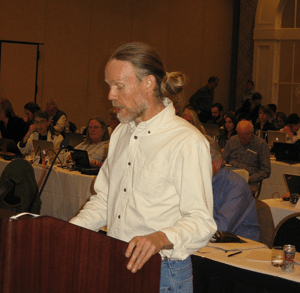 |
3:38 p.m. ET: Brad Alstrom, of the Blooming Foods Co-op with 12,000 members in Bloomington, Indiana, mentions the co-op is a long time Cornucopia member. He testifies as a Cornucopia citizen lobbyist and asks for removal of ferric phosphate. The Cornucopia Institute opposes the relisting of ferric phosphate because it is not effective without chelating agents that have known negative impacts to human health and the environment.
3:06 p.m. ET: Gwendolyn Wyard, of the OTA, focuses on the need for reapproval of gellan gum, encouraging stability for organic businesses, especially those moving away from carrageenan. And she mentions that adequate amounts of organic gylcerin exist to allow for the removal of the non-organic version from the National List.
Starr Molle, of Organic Valley, speaks in support of a dairy cow treatment, Acidified Sodium Chlorite, that is used as a teat dip. Will be on a future meeting agenda.
2:38 p.m. ET: Urvashi Rangen of Consumers Union discusses why they have downgraded the USDA organic label from their highest standard to meaningful. She indicates that they see added value from coupling organic with biodynamic or organic with certified humane. Consumers are getting smarter and smarter about these labels and what they are offering. You are getting beaten by these other labels that are offering something.
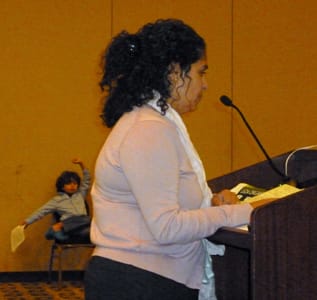 |
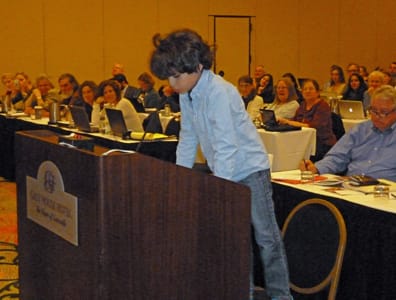 |
Max, Urvashi’s 8 year old son, told the board about his organic diet, what organic means, and what it should mean.
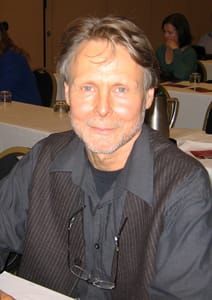 |
1:52 p.m. ET: As public testimony resumes after lunch, Dag Flack, of Nature’s Path, challenged the USDA on the sunset changes and asked the NOSB to take action.
He said he was “baffled” by and was “at a loss” about the NOP’s logic (or lack thereof) in changes that changed an act of nature (the setting sun) by an artificial construct (the sun never setting) …. Materials never coming off the List unless a supermajority of the NOSB takes action.
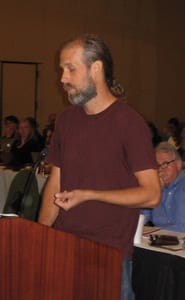 |
12:21 p.m. ET: Louisville resident, a stone mason and local musician, Brad Russell spoke as a citizen lobbyist for Cornuocopia. He noted how he has personally benefited from an organic diet.
Addressing the use of hydrogen cholride he said that the 2003 TR from Hydrogen Chloride does not discuss the latest research by USDA/ARS Researcher Greg Holt, who is currently in the final stages of developing a mechanical delinter. What it would take to bring mechanical delinting from these final research stages into commercial production is unknown because of an outdated TR.
11:57 a.m. ET: Jake Lewin, representing certifier CCOF, indicates that he shares “many of the sentiments” expressed by Jim Pierce of Oregon Tilth pertaining to the National Organic Program.
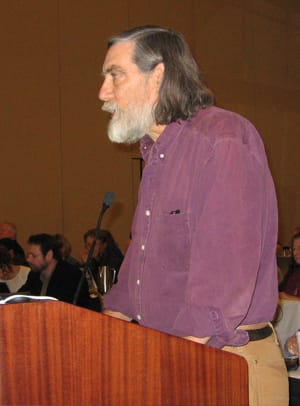 |
11:54 a.m. ET: Lisa Bunin, of the Center for Food Safety, hands out copies of their new report on the incompataibility of organics with ocean based aquaculture systems.
11:42 a.m. ET: Jim Gerritsen, representing the Organic Seed Growers and Trade Association and a Cornucopia policy advisor, shared images of his home farm in Maine. He criticized the appointment of individuals to NOSB slots that don’t fit the legal criteria, particularly to the farmer slot. He also spoke against the changes to Sunset, saying “we will not abide.” He also responded to questions about genetic engineering and its impact on organic farmers and their right to farm the way they choose.
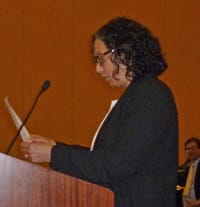 |
11:42 a.m. ET: Also speaking for the National Organic Coalition, Liana Hoodes says, “Let’s stop saying that loud and public criticism is hurting organics.” She adds that the use of synthetics is meant to be an exception.
11:38 a.m. ET: Jim Pierce, an Oregon Tilth employee, mentions in a humorous light that they are the best. On a serious note, he tells the NOP “good job.” He adds, “we agree with most NOP decisions.”
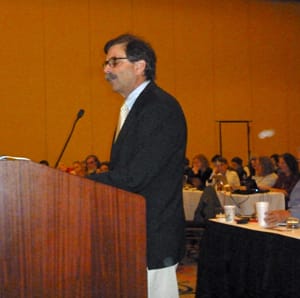 |
Mark Kastel |
11:34 a.m. ET: Cornucopia’s Kastel: “Mr. McEvoy, there has been an overwhelmingly negative response to the unilateral power grab by the USDA. But what has been your response? You are now holding listening sessions and meeting with NGO leaders. But you still seem to not hear the message. You know, it is self-serving to quote some who are telling you that they support …. Off the record.”
11:11 a.m. ET: Public testimony begins: Steve Etka, representing the National Organic Coalition, expresses their discontent with the Sunset changes, which he says turns the process on its head.
A “high hurdle” was set by the organic law requiring a supermajority to renew or re-list the synthetics that come before the board.
11:05 a.m. ET: New NOSB chair Jean Richardson (consumer rep), prior to public testimony, makes a few announcements. She says several things have been “corrected” for this meeting, stating that the NOSB “is once again chairing the meeting.”
She also mentions that the NOSB policy and procedures subcommittee has been “reactivated,” after the USDA had discontinued the committee earlier this year. One of their tasks will be developing a new policy on annotations, something that the USDA had discontinued.
Annotations, or stipulations, had previously been used to limit the way specific materials could be used. One recent example was the USDA’s refusal to attach an annotation (that the NOSB had passed) prohibiting the use of carrageenan in infant formula.
10:53 a.m. ET: Dr. Lisa Brines, the National List Manager at the NOP, says in her report that the majority of the 200+ non-organic and synthetic materials allowed for use in organics will be up for review in 2017 (and Sunset process).
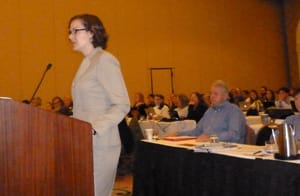 |
10:17 a.m. ET: The new USDA Organic Policy Advisor, Besty Rakola, is presenting her overview of the work underway to integrate organic policy inside the various arms of the USDA. This is her first NOSB meeting.
10:03 a.m. ET: NOSB board member Jay Feldman (Beyond Pesticides) questions McEvoy about his characterization of a climate of “intimidation” which McEvoy says is preventing some people from voicing support for the USDA’s changes in organic governance. Feldman notes that the simple expression of a viewpoint by members of the public may be perceived as intimidating by some.
It’s worth noting that the vast majority of non-profit groups, like Cornucopia, have been strongly critical of the USDA’s changes imposed on the NOSB.
9:42 a.m. ET: As he continues his remarks, Miles McEvoy says he was surprised that only 60 people were on an Oct. 16 conference call and listening session organized by the NOP to gather feedback on the NOSB. Cornucopia’s report on that call noted that the commentors were overwhelmingly critical of the changes to organic governance and authority.
McEvoy says he hears more support for the changes during his travels but that those individuals are “fearful” to speak out.
9:34 a.m. ET: McEvoy says that National Organic Program staff has grown to 43, from 11 when he started. He mentions that NOP worked to provide information to the FDA for the draft of the new produce food safety rule (Cornucopia is currently analyzing the new draft from FDA).
So far a record number of complaints have been filed with the NOP this year: 411. “I think that’s good,” he says, explaining that the public is watching organic activities. Two-thirds of complaints concern uncertified operations, with 20% involving labeling or fraud violations.
9:19 a.m. ET: Miles McEvoy, the head of the National Organic Program, gives his report to the NOSB and public. He notes that the long awaited Origin of Livestock rule will likely be released in the first half of next year (he had called this a priority in April 2010). Clarity on nanotechnology will be provided next year, based on another several-year-old NOSB recommendation (see this Fall’s Cultivator from Cornucopia for more). Aquaculture will not be ready in the near future.
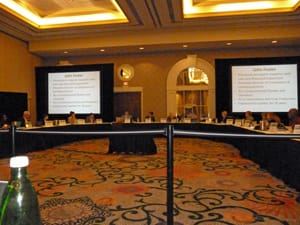 9:00 a.m. ET: Fall NOSB meeting opens in Louisville. Note the new barrier put in place to slow or block protestors from coming to the front of the room (last meeting was adjourned temporarily when protestors from the Organic Consumers Association voiced their displeasure with the USDA’s unilateral changes to the governance and authority of the NOSB).
9:00 a.m. ET: Fall NOSB meeting opens in Louisville. Note the new barrier put in place to slow or block protestors from coming to the front of the room (last meeting was adjourned temporarily when protestors from the Organic Consumers Association voiced their displeasure with the USDA’s unilateral changes to the governance and authority of the NOSB).

